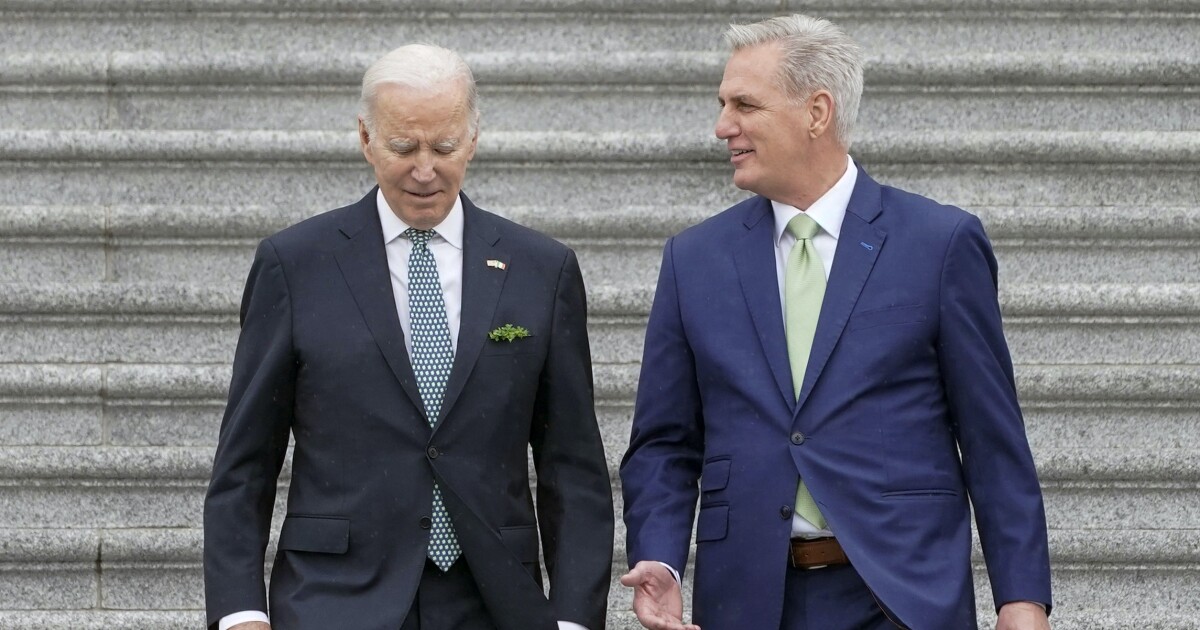

It’s been three months since Kevin McCarthy (R-CA), freshly elected as speaker of the House, called on Joe Biden to negotiate spending cuts in exchange for hiking the debt limit.
Yet as Congress returns from a two-week recess on Monday, House Republicans are no closer to resolving what has become a protracted fight with the president.
‘OUR JOB IS OVERSIGHT’: CONGRESS TO PROBE DAMAGING LEAK OF CLASSIFIED PENTAGON DOCUMENTS
Lawmakers fly back to Washington on Monday to consider a series of measures being voted on this week, including an effort to roll back police reforms enacted by the D.C. Council and legislation banning transgender athletes from competing in girls sports.
But looming in the background is a more daunting task for House Republicans: coalescing behind an opening offer in debt ceiling negotiations with the White House.
McCarthy’s pledge to push for deep spending cuts, made to hard-liners in his conference to win the speaker’s gavel, put him on a collision course with Biden, who is adamantly refusing to make concessions. McCarthy is slated to give a major speech on the debt limit at the New York Stock Exchange on Monday morning, a move reminiscent of President Ronald Reagan’s own speech there 37 years ago.
The impasse threatens to send the United States into default as it approaches an unknown “X date” to lift the debt limit. The Treasury Department, which is using “extraordinary measures” to pay its federal obligations since hitting the government’s $31.4 trillion cap in January, has estimated it could run out of money as soon as June, though a late summer deadline is more likely.
That means Washington will have to agree to a deal before lawmakers depart for the monthlong recess in August.
Biden and McCarthy met at the White House for an initial meeting in February, even as the president reiterated his demand for a clean debt ceiling hike, and the pair put on a show of bipartisanship at a St. Patrick’s Day luncheon six weeks later.
But no progress has been made between the two leaders with just months left to act.
McCarthy pressed for a second meeting shortly before the Easter recess, penning a letter in which he blamed Biden for not scheduling another sit-down. The move prompted the president to return the finger-pointing with a common refrain among Democrats: “Show us your budget.”
Biden argues negotiations won’t be productive without McCarthy putting forward a budget that details the cuts Republicans want to make and refuses to sit down with him until then. The president says the ball is in Republicans’ court after the White House released its own 2024 budget blueprint in March.
McCarthy outlined some of the possible demands in his March 28 letter, but the president quickly demanded a “full set of proposals.”
The posturing from the White House suggests the president views himself as having the upper hand in the stalemate. Republicans are historically blamed for government shutdown fights, and there’s no reason to expect the debt ceiling standoff is any different.
But more importantly, it’s not clear McCarthy has the votes needed to pass the spending cuts he’s demanding with only a four-seat majority in the lower chamber. He has to bridge the demands of hard-line members of the Freedom Caucus with the reservations of centrist Republicans up for reelection in swing districts.
Democrats are already messaging that Republicans want to slash popular programs and hurt the poor, and centrists may balk at taking a politically tough vote.
The sheer difficulty of getting the fractious Republican conference to agree on a set of demands is the greatest test yet for McCarthy’s speakership, one that has led to simmering tensions within House GOP leadership.
McCarthy has reportedly disparaged his top deputies in private, prompting blowback from lawmakers who say the speaker is trying to find a scapegoat in case their fight backfires.
But there are signs Republicans could rally around a set of demands. The Main Street Caucus, which represents a group of 70 “pragmatic” Republicans, outlined on Thursday a list of concessions it believes could get 218 votes.
The list includes clawing back some $70 billion in COVID-19 relief funds that states have not spent, reversing Biden’s student loan forgiveness program, and capping discretionary nondefense spending at 2022 levels.
The outline, sent to McCarthy in a letter on Thursday, also showed an appetite for energy permitting reform as part of a deal and called for work requirements for food stamps beneficiaries.
The demands are similar, if less expansive, than those put forward by the ultraconservative House Freedom Caucus in March. Any deal would need buy-in from its 30-some members, who were able to force the concessions during McCarthy’s speakership election in the first place.
But they show some areas of consensus as House leadership tries to unite the “five families” of the GOP conference.
House Republicans are drafting legislation that includes a set of demands with the widest support, according to Politico, and hope to pass the measure by the end of May.
CLICK HERE TO READ MORE FROM THE WASHINGTON EXAMINER
The legislation would amount to the GOP’s first formal offer in talks with the White House and, if passed, would signal the GOP is serious about forcing cuts.
Thus far, Senate Republicans, who lack a majority in the upper chamber, are letting the House GOP take the lead on negotiations.





